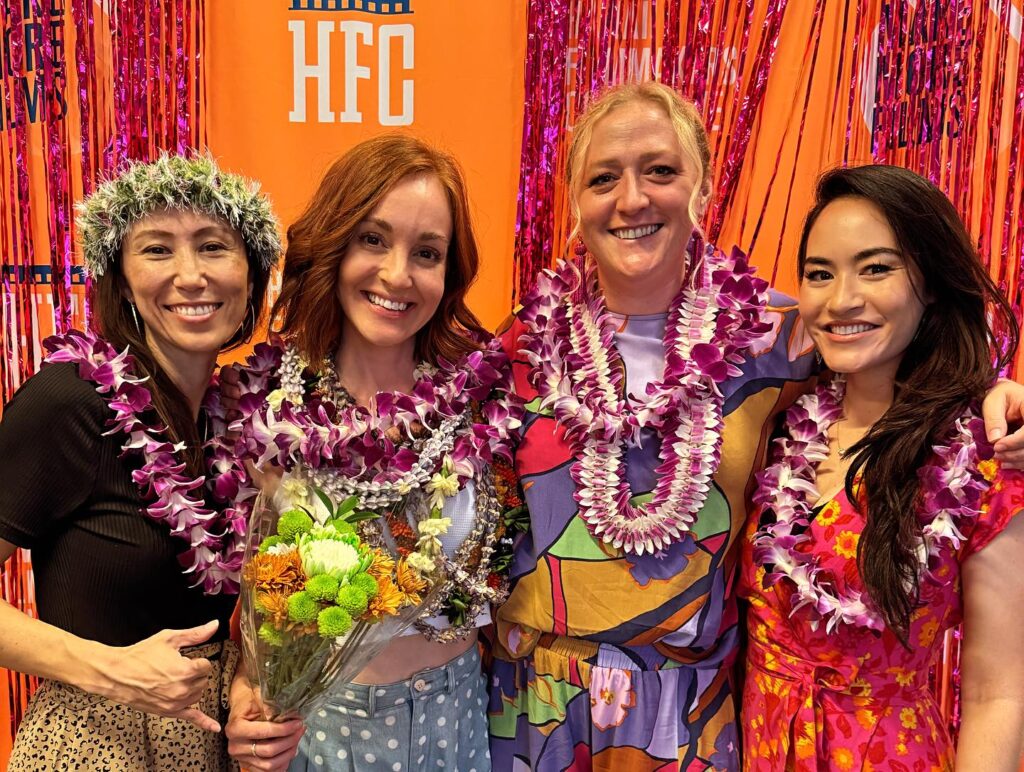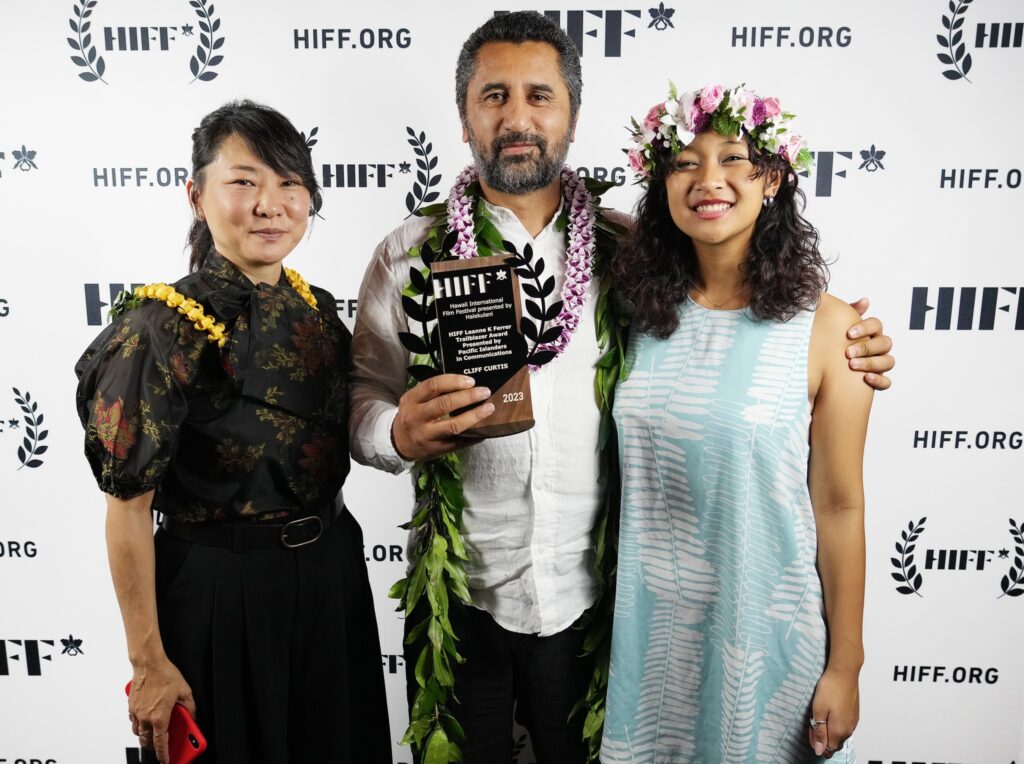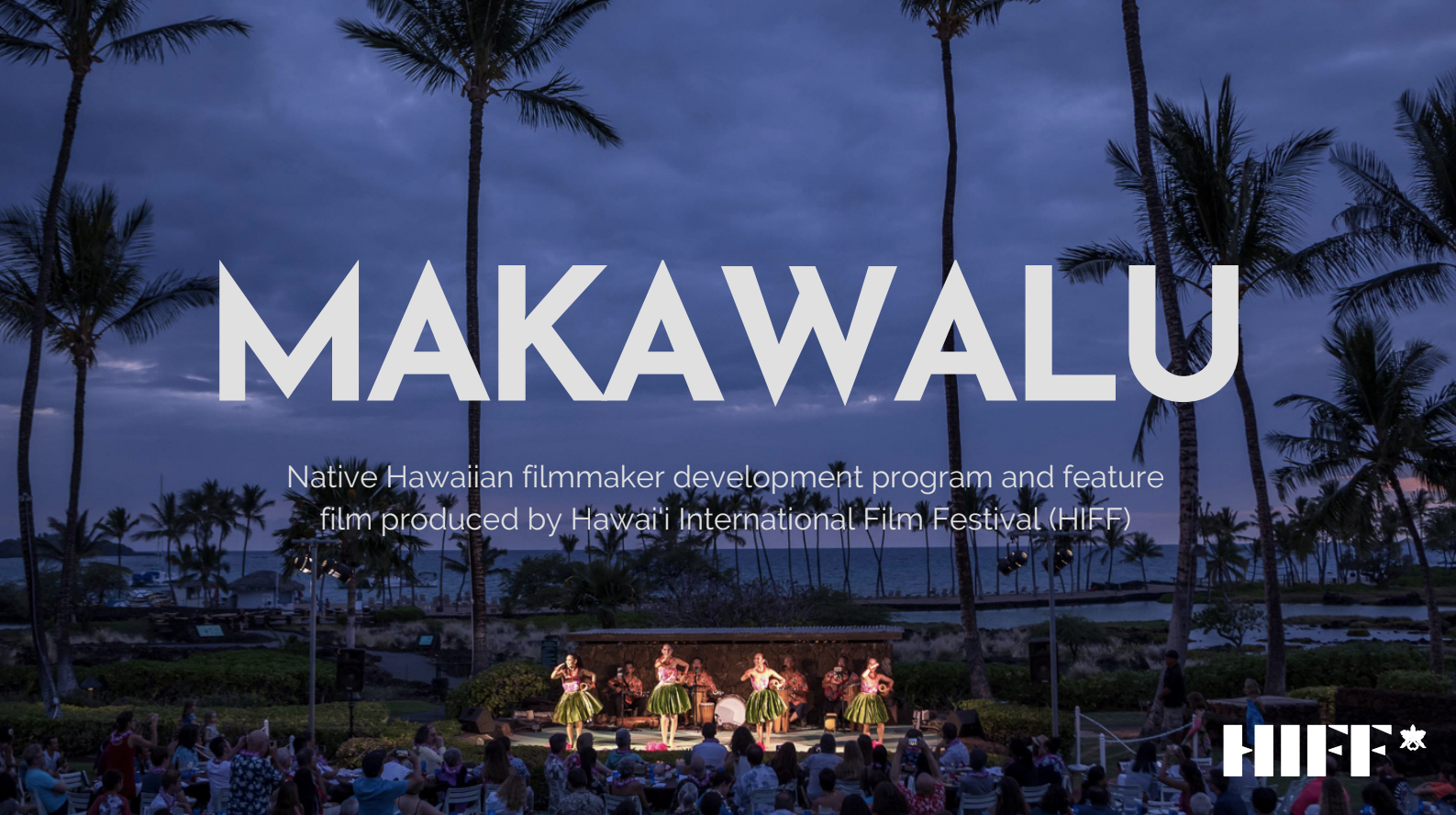This year’s HIFF not only featured a number of films “Made in Hawai‘i” in its programming, but also spotlighted a new filmmaking initiative and shared perspectives on the current status of Native Hawaiians in the industry.
One of the films discussed in HIFF’s panels this year is MAKAWALU, a project in development.
MAKAWALU is a filmmaking lab and production that launched in 2021, a HIFF initiative that brings together 8 Kānaka Maoli (Native Hawaiian) directors to collaborate together and produce a feature film.
Modeled after a New Zealand initiative, the program provided a creative retreat for filmmakers to develop and workshop the project and meet with industry professionals. The filmmakers have followed the lab with ongoing creative development and mentorship throughout the process.
Goals also extend beyond producing a single feature; HIFF aims to have future iterations of the project, creating and building upon development support, a growing creative community, and cultivating access to an industry network and pipelines to production.
The initiative is ambitious in its future impact: creating long-lasting sustainability for filmmaking in Hawai‘i.
MAKAWALU also stands as a newer addition to existing resources for the local filmmaking community in Hawai‘i:
There’s the Hawaii Filmmakers Collective (HFC), which connects creatives with the local filmmaking community. HFC provides different types of programming, with panels, pitch sessions, and networking opportunities. The collective can also assist with directing creators to the right resources for equipment, crew, and production insurance. They promote independent filmmaking and screen local films; HFC is also known for their annual 48- and 72-hour film challenge competitions.

The programs at Creative Lab Hawai‘i, which is run by the state, support the development of creative talent with panels, workshops, and immersive programs. Areas of focus include producing, directing, screenwriting, and songwriting, as well as fashion, technology, and animation. Workshops and program eligibility requirements vary; they aim to help creatives prepare their projects for further development, production, sales, or distribution.
Hawai‘i Women in Filmmaking is a nonprofit organization focused on supporting and advocating for wāhine in film, offering workshops, production services, and screenings, including opportunities for filmmakers to share works-in-progress. There is also a focus on cultivating the next generation of filmmakers with mentorship and opportunities for young filmmakers to develop their skills through camps offered.
Pacific Islanders in Communications (PIC) has funding opportunities for projects with Pacific Islander talent and/or with narratives that include the Indigenous Pacific Islander experience, including short films and non-fiction programming. PIC also accepts submissions for “Pacific Heartbeat,” the public television series it produces.

But what is the current status of Native Hawaiians in the industry?
In The Rise of Hawai‘i Cinema panel at HIFF43, Kānaka Maoli industry professionals shared the distinctions that have characterized their career paths and provided a pulse on the current status of Native Hawaiians in the industry in a festival panel.
A few key takeaways emerged from the thoughtful discussion.
The presence and narratives of Native Hawaiians onscreen have come a long way.
Actor and playwright Moses Goods shared that he once contemplated moving to Los Angeles for his career. He was warned that he should prepare his “Mexican accent,” due to the limited roles for Native Hawaiian actors. He never made it to Southern California (a blessing in disguise), but was able to develop his own skills and identity on Maui. Since then, he has worked on a number of projects, including Kānaka-led productions.
Independent films and studio films seem to be doing well; the local filmmaking industry is seeing the respective success of both.
Filmmaker Ciara Lacy cited that there was a “burgeoning indie scene,” as well as a big studio filmmaking presence. Producer and stunt coordinator Brian Keaulana has worked on various studio projects, having been in the industry for over 40 years. He also noted the continued importance of Kānaka Maoli in the industry, especially “the need for controlling the narratives.”
And, in fact, voices to support and shape narratives – within the studio side – have grown.
Kalikolehua Hurley, a senior manager culture consultant at Disney, is at least one Kanaka Maoli voice in the room. “Things have gotten better, with more opportunities, and not just one writer,” she said. Hurley explained that there are more opportunities for creative consultants to be in the room, sharing their expertise on culture and identity, voices essential to achieving more authentic storytelling.
Director Ty Sanga also shared the importance of having supportive voices. “I’ve been fortunate to find collaborators willing to fight for the same thing,” Sanga said.
And in the creative process, the decision to raise a note is critical. Lacy said that when she sees red flags, she tries to “find a way to discuss it.” Hurley echoed the sentiment, underlining the importance of creative teams and consultants in having the support to raise a note.
Panelists also pointed out the power of saying no to a project or a creative choice. “I’ve walked away from projects,” said Goods. “I make sure that I will be heard.”
Overall, the future outlook for Native Hawaiians in the industry is hopeful and optimistic, with an emphasis on the importance of having thoughtful discussions on narratives and having supportive voices in the creative process.
Gains to be made in the future include increasing the presence of Kānaka Maoli on the talent representation side – at agencies and management companies. Panelists also recognized the need for training and instilling values in the next generation.
“What I envision for my community is a strong Kānaka community within the industry,” Goods shared.
 Melissa Kim is a writer, journalist, and media consultant. Her work has highlighted independent films, Korean talent, and Asian American artists at SXSW, Sundance, Tribeca, and the Hawai’i International Film Festival. Her articles have been published in NBC News, Character Media, Koreanfilm.org, and Mochi Magazine. She also co-produces Kdrama Reports, a podcast covering Korean content. Melissa’s experience in the media industry has led her to many different roles, from organizing open call auditions and directing a short film to working in international television distribution and assisting at MIPCOM. Melissa was also part of the Start-Up Writers Team for “Two Scoops Funny,” a show featuring original comedy sketches at last year’s Hawaii Comedy Festival. Melissa has an M.A. in Asian Studies; her graduate research has examined South Korea’s independent film movement and the impact of Korean television dramas on the American distribution market.
Melissa Kim is a writer, journalist, and media consultant. Her work has highlighted independent films, Korean talent, and Asian American artists at SXSW, Sundance, Tribeca, and the Hawai’i International Film Festival. Her articles have been published in NBC News, Character Media, Koreanfilm.org, and Mochi Magazine. She also co-produces Kdrama Reports, a podcast covering Korean content. Melissa’s experience in the media industry has led her to many different roles, from organizing open call auditions and directing a short film to working in international television distribution and assisting at MIPCOM. Melissa was also part of the Start-Up Writers Team for “Two Scoops Funny,” a show featuring original comedy sketches at last year’s Hawaii Comedy Festival. Melissa has an M.A. in Asian Studies; her graduate research has examined South Korea’s independent film movement and the impact of Korean television dramas on the American distribution market.
The HIFF ONLINE CREATIVES & CRITICS IMMERSIVE (HOCCI) program supports sustainable film criticism in Hawai‘i through mentorship and paid career opportunities. The mission of HOCCI is to broaden diversity in film criticism across the Pacific region and use influencer branding strategies to spark career opportunities in Hawai’i, not be hampered by oceans, state borders and distance, because geography is no longer a barrier. The 2023 HOCCI is supported by Critical Minded, a grant-making and learning initiative that supports cultural critics of color in the United States.



